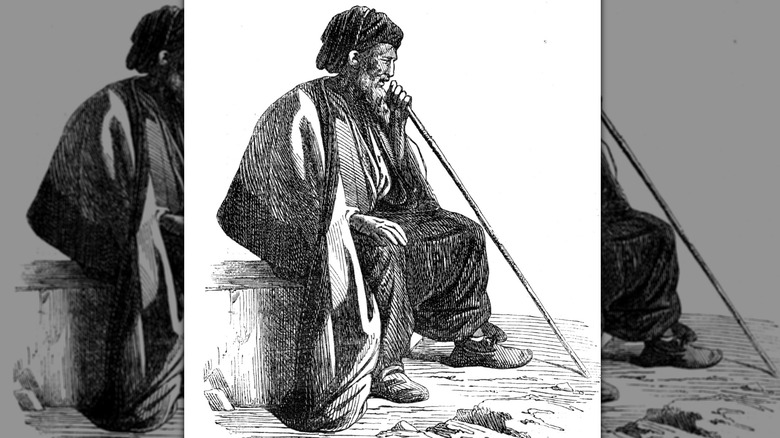Who Were The Nazarene In Jesus' Time?
The Christ myth theory — the idea that there never was a Jesus of Nazareth, that he was a fictitious figure — has never been accepted among mainstream scholars, secular or religious. One of the arguments against it is the fact that Jesus is described as being from Nazareth. The association between him and his hometown is a strong one, and it's mentioned throughout the gospels. It's such a strong association, in fact, that it raises inconvenient questions — the Messiah is meant to be from Bethlehem, not an unremarkable piece of Galilee. The Nativity story as told in Matthew and Luke has the appearance of trying to have one's cake and eat it too by injecting prophecy into the established and well-known biography of a man who truly existed.
The title "Jesus of Nazareth" might sound like it refers to such a tale, though the passages describing him as such can also be translated as "Jesus the Nazarene." This identifies his home city the same way we might refer to someone as a Philadelphian or a Londoner. But per Britannica, the original Greek used both "Nazarēnos" — "of Nazareth" or "Nazarene" — and "Nazōraios," which may have had religious rather than geographic implications. "Nazōraios" is possibly a term for a Jewish sect in operation during the time of Jesus. It can be translated as "devotee" or "observant," and those covered under the term would have initially been under the umbrella of Judaism. That all changed after the life and death of Nazareth's most famous son.
Early Christians, and then a Christian sect, were both called Nazarenes
In Acts 24, the lawyer Tertullus brings charges against Paul the Apostle. "We have found this man to be a troublemaker, stirring up riots among the Jews all over the world," says Tertullus. "He is a ringleader of the Nazarene sect and even tried to desecrate the temple; so we seized him." It's the first time the Bible mentions the Nazarenes as a distinct sect. And in the earliest days of Christianity, the followers of Jesus may have been referred to as Nazarenes. Those in the 1st-century Jewish community who opposed or disdained the new religion used it as a pejorative on account of the backwater reputation of Nazareth and Galilee (per The Spurgeon Center). The Christians of the Roman Empire called themselves "saints" or followers of "The Way."
Over time, "Nazarene" and "The Way" faded as terms for the followers of Jesus, and "Christian" became the common name. But the earlier name survived and found itself applied to a new sect, this time within the Christian community. By the 4th century, a Christian group within Syria was known as the Nazarenes. A small and isolated faction, possibly the descendants of refugees from Jerusalem, these Nazarenes kept their own Aramaic gospel. They were Christian in that they accepted the divinity of Jesus, but they retained the Jewish traditions and Mosaic law that had been discarded by mainline Christianity.
Nazarene churches and orders still exist today
According to the Jewish Encyclopedia, the Nazarenes of the 4th century were likely split and absorbed over a hundred years or so, partly by mainline Judaism and partly by mainline Christianity. But the name "Nazarene" has endured. A German art society that was part of the broader Romantic movement was known as the Nazarene, and the Catholic Brotherhood of Nazarenes, founded in 1545 (per National Geographic), persists to this day. It was brought from Spain to the New World and subject to a ban in 1861 by the Mexican government to aid in separating church from state. But the brotherhood has revived and flourished in recent decades.
"Nazarene" is also a name used for whole faiths to this day. Growing out of revival movements from the 19th century, the Church of the Nazarene is a Protestant denomination and a Methodist, evangelical church. It claimed almost 2 million followers as of 2010 (per the church website). In some ways it fits comfortably with other conservative evangelical denominations in America — the church maintains a hostile view towards LGBTQ+ matters and forbids use of alcohol or tobacco. In other respects, the Nazarenes are prepared to accommodate modernity and science, as many members accept the reality of evolution.


